Step Out of Line
PEOPLE Magazine relays the details of the Emmy Award acceptance speech of actress Alex Borstein in 2019 as she paid homage to her grandmother "who barely survived the Holocaust.":
Alex Borstein took home the Emmy for Supporting Actress in a Comedy Series ... Borstein paid respect to her grandmother, who barely survived the Holocaust. "I want to dedicate this to the strength of a woman ... She was in line to be shot into a pit and she said, 'What happens if I step out of line?' .... And he said, 'I don't have the heart to shoot you but somebody will.' ... And she stepped out of line." ... Because of her grandmother's decision, she is here and her children are here, she said. "So, step out of line, ladies," she said. "Step out of line."

For video of the speech, click here and navigate to minute 2:10.
While the emphasis of her speech was decidedly to encourage women, specifically, to be brave, to be bold, the story is universal in its application.
There will be times in life when our backs are up against the wall (or our feet are at the edge of a pit with a gun pressed to our back). In those moments, don't let the world and its values (or lack thereof) run roughshod over you. Don't cower before those who persecute, abuse, or bully you.
Be bold. Be brave. Dare to "step out of line."
"Even though I walk through the valley of the shadow of death, I will fear no evil, for you are with me; your rod and your staff, they comfort me" (Psalm 23:4, ESV).
"For God gave us a spirit not of fear but of power and love and self-control" (2 Corinthians 1:7, ESV).
Knitting Away Idleness
Weird Wonders reports:
In 1918, if you saw a woman walking down the street, chances are her hands weren’t idle. With needles clicking and yarn flowing, she was likely knitting on the move—adding rows to a pair of socks while heading to work or strolling through town. It wasn’t unusual. It was everyday resilience, wrapped in wool.
During [World Wars I & II], knitting wasn’t just a pastime—it was a patriotic act. Women across the Allied nations answered the call to support soldiers overseas by crafting socks, scarves, mittens, and caps. Red Cross campaigns and posters urged them to “Knit for Victory,” and they responded—often using every spare moment to help. Even their walks became turned into a workshop.
But this wasn’t just about necessity. It showed skill, determination, and a beautiful kind of multitasking. These women made the most of each moment, choosing usefulness over leisure, weaving warmth and care into every stitch. In a time without modern distractions, they found meaning in motion—turning something as simple as walking into a gesture of hope and solidarity.
It’s a small glimpse into the strength of that generation—and the quiet ways they changed the world.
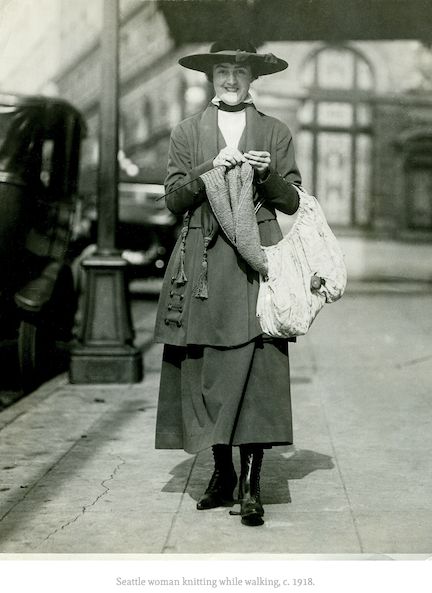
Knitting while walking was more than just a practical skill—it carried deep cultural significance. In many communities, particularly in Scotland and England, it symbolized efficiency, industriousness. Women, especially fisherwomen, would knit while walking to maximize their productivity, ensuring that every moment was used most efficiently.
Beyond practicality, knitting while walking also reflected social and communal traditions. It was often done in groups, fostering a sense of community and shared purpose. In some cases, it was even seen as a form of resistance and empowerment, as women used their craft to support their families and contribute to local economies.
The act of knitting while walking, in particular, reinforced the idea that women could balance domestic responsibilities with broader societal contributions.
But knitting in what would otherwise be "idle" moments was NOT just female phenomenon. Even young school boys, prison inmates, and taxi-cab drivers got in on the action.
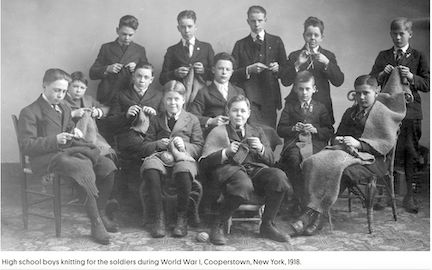
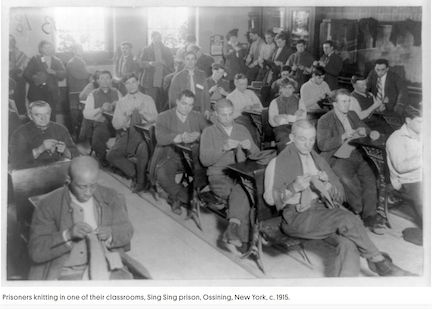
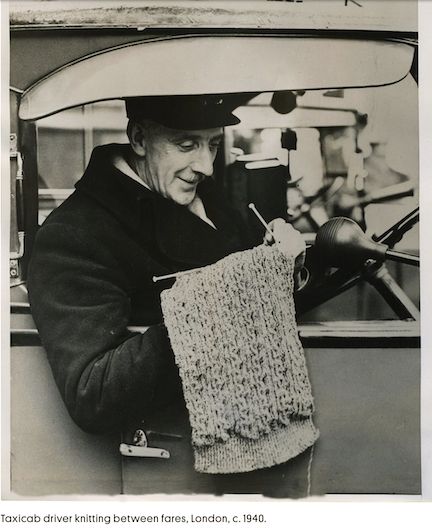
Time is ticking away. Are you making the best use of it?
Okay, you may not want to take up knitting. But are there small habits you can incorporate into you day to turn your idle time into more productive time? Perhaps making phone calls of encouragement while driving to work or the grocery store, or going through your prayer list while fixing supper, or listening to Scripture while you mow the lawn or work on the car. Or better still, turn off the TV and go mow your elderly neighbor's lawn! You get the idea ... just be creative!
Now, by way of balance, we are not called to fill EVERY idle moment with meaningful activity. After all, it was the Lord Himself who ordained the Sabbath rest. Yet we are still admonished in Scripture to make the best use of our time to: 1) to take opportunities for ministry and service, and 2) to avoid the traps of idle hands, hearts, and lips.
So pick up some needles [literal or figurative LOL] and get going! Like the knitters of generations gone by, "in quiet ways" we "can change the world!"
"Look carefully then how you walk, not as unwise but as wise, making the best use of the time, because the days are evil. Therefore do not be foolish, but understand what the will of the Lord is" (Ephesians 5:15-17 ESV).
"Besides that, they learn to be idlers, going about from house to house, and not only idlers, but also gossips and busybodies, saying what they should not" (1 Timothy 5:13 ESV).
She looks well to the ways of her household and does not eat the bread of idleness" (Proverbs 31:27, ESV).
"For we hear that some among you walk in idleness, not busy at work, but busybodies" (2 Thessalonians 3:11 ESV).
"A slack hand causes poverty, but the hand of the diligent makes rich" (Proverbs 10:4, ESV).
"For you remember, brothers, our labor and toil: we worked night and day, that we might not be a burden to any of you, while we proclaimed to you the gospel of God" (1 Thessalonians 2:9 ESV).
"A little sleep, a little slumber, a little folding of the hands to rest" (Proverbs 6:10 ESV).
Women Fleeing Churches Even As Men Return
The NOT THE BEE (NtB) social news site recently reported that Gen Z women are leaving Christian churches in record numbers, according to a surprising new poll.
But even more surprising is that the recent trend of men exiting the Church en masse, it is now reversing, so even as women are now leaving in record numbers, men are actually returning.
According to the pollsters:
Over the last two decades, which witnessed an explosion of religious disaffiliation, it was men more than women who were abandoning their faith commitments. In fact, for as long as we've conducted polls on religion, men have consistently demonstrated lower levels of religious engagement. But something has changed. A new survey reveals that the pattern has now reversed.
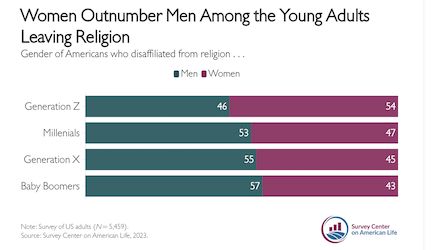
"Men, meanwhile," reports NtB, "seem to be growing into a greater devotion [to] religion in a way that has been unfamiliar to America since the 20th century began." This is evidenced by more findings from the study:
What's remarkable is how much larger the generational differences are among women than men. Gen Z men are only 11-points more religiously unaffiliated than Baby Boomer men, but the gap among women is almost two and a half times as large. Thirty-nine percent of Gen Z women are unaffiliated compared to only 14 percent of Baby Boomer women.
What's more, NtB reports,
This recent study [also] showed 57% of young men want to start a family compared with 45% of young women. It is far from normative for a society to raise such a large percentage of young ladies (who are the gatekeepers for sexual selection and procreation) who do not want to start families.
All of this, on the one hand, spells real trouble for American churches and American culture. As more and more women choose to not procreate, our population, and the rockbed of our society, the family, will continue to shrink or even die. And as women abandon our churches, many of the core functions of those bodies will go unfullfilled.
Volunteer ministries, for example, are largely spearheaded by women. With fewer women, the Church is likely to look different in how it relates to the culture.
Yet, there is a promising silver lining emerging, as young men return to the church, and return to their love for and desire for family.
Let us pray the Lord will use this generation of young men to hold the line, reassert themselves as strong husbands, fathers, and church leaders (even as they assume many of the volunteer positions traditionally held by women). And let's pray for this generation of young women, to rediscover their critical roles in our churches and families. Finally, pray for the Church as a whole, that it will likewise hold the line of truth and genuine spirituality, so these young men and women have someplace to come back to.
"And let us not neglect our meeting together, as some people do, but encourage one another, especially now that the day of his return is drawing near" (Hebrews 10:25, NLT).